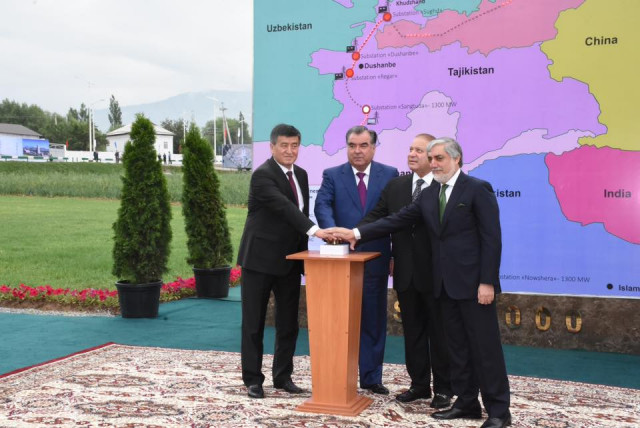Challenges of CASA-1000
Leaders of Pakistan, Tajikistan, Afghanistan and Kyrgyzstan gathered on May 12 to launch the CASA-1000 project

Prime Minister Muhammad Nawaz Sharif along with the leaders of Tajikistan, Kyrgyzstan and Afghanistan innuagrating CASA 1000 project at Tursunzade City on Thursday. PHOTO: PID
The two Central Asian states need the project to export their surplus electricity and this is to the advantage of the two energy-starved neighbours in South Asia. The biggest hurdle, however, remains security challenges. Afghanistan and Pakistan have serious kinks to iron out with the Torkham border crossing between the two countries remaining shut for three successive days, indicating the poor state of bilateral relations. Trade issues have remained hostage to the thorny bilateral relationship with accusations flying from both sides. Pakistan and Afghanistan need to focus on the greater good if CASA-1000 is to be successful. But when security challenges trump whatever good there is to be had, this seems like a difficult task. The World Bank has already admitted that security remains the biggest challenge to this project. Miscreants will look for every opportunity to create hurdles for the project’s implementation. Both countries need to overcome this highly troublesome aspect through mutual cooperation and bridge the trust deficit that exists. Perhaps, if all parties realise that a peaceful, prosperous future for the region lies in greater inter-dependence, they might start working for each other’s mutual benefit. As of now, the precarious security situation in Afghanistan and its far-reaching impact on the region remain the biggest hurdle in the way of CASA-1000’s successful completion.
Published in The Express Tribune, May 14th, 2016.
Like Opinion & Editorial on Facebook, follow @ETOpEd on Twitter to receive all updates on all our daily pieces














COMMENTS
Comments are moderated and generally will be posted if they are on-topic and not abusive.
For more information, please see our Comments FAQ